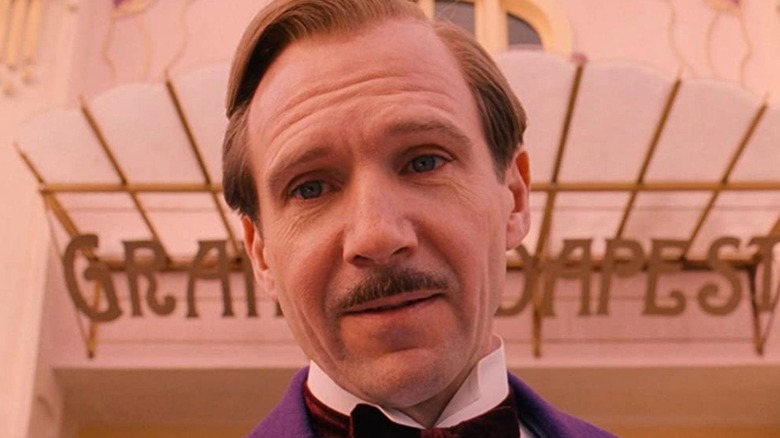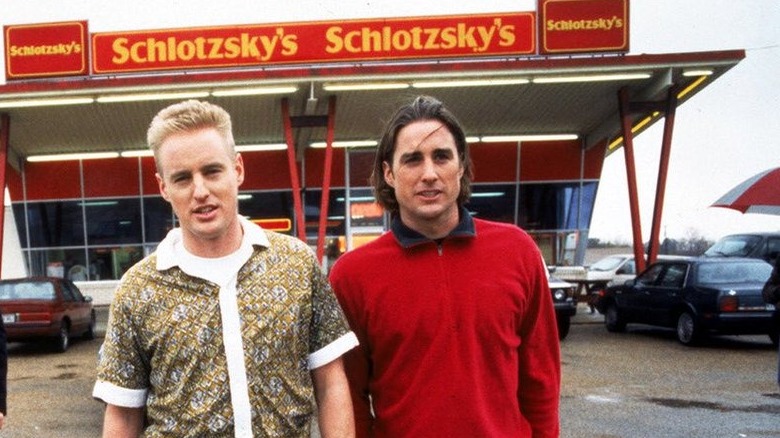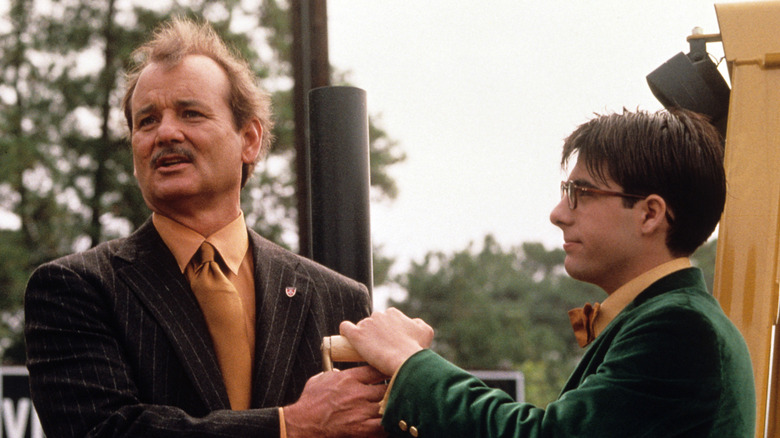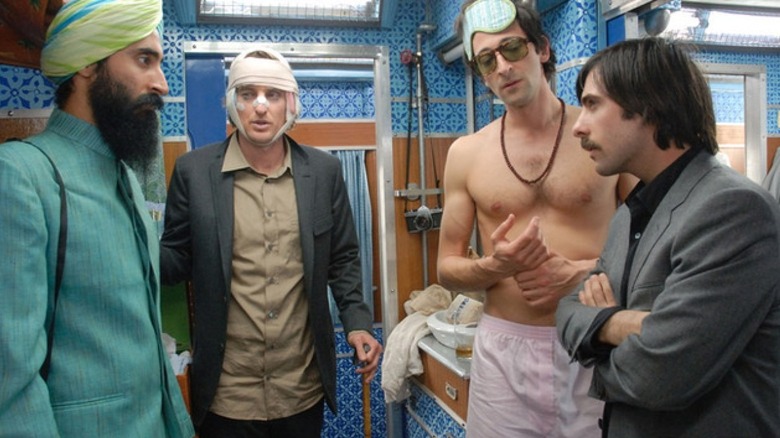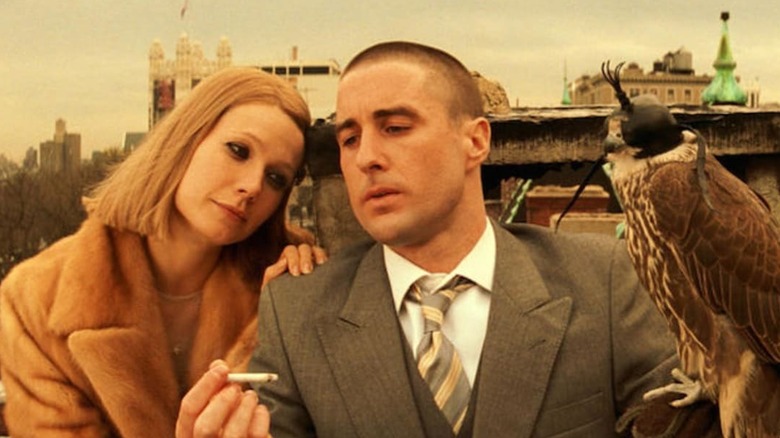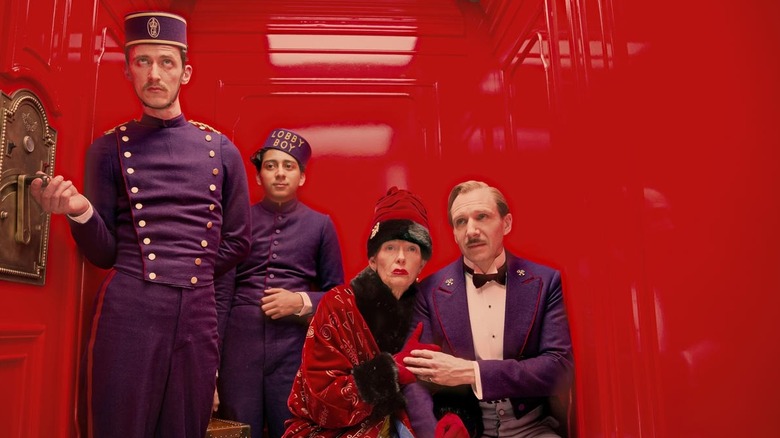Wes Anderson Movies Ranked By How Much Money They Made
There are many words that immediately spring to mind at the mention of Wes Anderson's works. "Gorgeous" is certainly one, given how visually resplendent his films are. "Humorous" — that one's obvious given how all of Anderson's features are slyly masked comedies. Perhaps even "poignant" crosses one's mind, given how titles like "Fantastic Mr. Fox" or "The Grand Budapest Hotel" are capable of wringing a surprising amount of emotional investment from their audiences.
But one phrase that doesn't immediately leap to mind when one considers Wes Anderson is "box office success." That's not a slam on Anderson; it's merely a pragmatic reflection of how his idiosyncratic directorial efforts just don't seem to attract the moviegoing public in droves like "Transformers" or "Venom" movies do.
In reality, though, Anderson has helmed several box office hits over the years. Sure, some of these films haven't totally cleaned up, but looking at the global box office performances of his works from lowest- to highest-grossing, it becomes clear that "lucrative" should be as widely associated a word as any other with the delightful filmography of Wes Anderson.
9. Bottle Rocket
Every director has to start somewhere, and for Wes Anderson, that start was with "Bottle Rocket." A small 1996 film shot in Anderson's home state of Texas about two friends who attempt to pull off a series of heists, "Bottle Rocket" was the very definition of under-the-radar when it first came out. The filmmaker didn't have the considerable fanbase he'd cultivate in the years to come. Heck, the film's leading man, Owen Wilson, was not the recognizable leading man he'd be in less than a decade, either, since "Bottle Rocket" was his very first time appearing in a feature-length movie.
Simply put, "Bottle Rocket" was a niche title that didn't have big box office expectations attached to it. At the worldwide box office, "Bottle Rocket" made just $407,488, not a great sum considering its $5 million budget. In the film's defense, though, "Bottle Rocket" played in no more than 49 theaters in its North American run, severely limiting its box office potential. It likely didn't help that "Bottle Rocket" was released by Sony/Columbia Pictures, a mainstream studio that, save for the occasional "El Mariachi," wasn't well-known for launching unorthodox indie titles. If "Bottle Rocket" had been handled instead by a smaller arthouse studio, who knows how its box office run could've gone.
The only Anderson film to make under $1 million globally, the minimal box office draw of "Bottle Rocket" now stands as a showcase for just how far Anderson has come in his decades of filmmaking.
8. Rushmore
With his first movie, Wes Anderson had established some of his most distinct filmmaking traits and his career-long connection with Owen Wilson. With his sophomore effort, "Rushmore," the filmmaker would not only cement further hallmarks of his style (including his bond with actors like Bill Murray and Jason Schwartzman), but he'd also achieve a new level of visibility. Whereas "Bottle Rocket" never played in more than a handful of theaters, "Rushmore" would eventually receive a wide theatrical release in North America. With this film about two friends of vastly different ages and backgrounds and their love for the same woman, Anderson was about to enter a whole new league.
Expanding into wide release at the start of 1999, "Rushmore" did have some hurdles to surmount, including the fact that Anderson and most of the movie's cast (save for Bill Murray) arguably weren't household names. It was also going up against a variety of arthouse titles that had scored slews of Oscar nominations. In the end, "Rushmore" couldn't quite clear all of those problems, ending up with a $19 million global cume – a sum that was just under twice its budget. However, that was a gargantuan improvement on "Bottle Rocket," and its leggy run at the domestic box office was a credit to the strong word-of-mouth reputation this title developed. With "Rushmore," Anderson managed to hit a new level of box office success he'd continue to top throughout his career.
7. The Life Aquatic with Steve Zissou
The only problem with having a big hit is that it's difficult to follow it up: You made lightning strike once, but can you do it again? Such was the question for Anderson, who scored his first big box office hit with "The Royal Tenenbaums." This turned up the pressure on his next project to live up to the financial heights he'd proven able to climb. That follow-up project would be "The Life Aquatic with Steve Zissou," which took Anderson, a star-studded ensemble cast, and moviegoers under the sea.
Unfortunately, despite Anderson's recent box office glories, "The Life Aquatic" made less than half of what "Tenenbaums" did at the global box office with a $34.8 million worldwide haul. On a considerable $50 million budget, this water-bound Anderson effort lost a notable chunk of cash. More muted reviews and the film's niche subject matter (a pastiche of the real-world filmmaker and marine explorer Jacques Cousteau) dampened the film's appeal to the general public. It didn't help matters that December 2004 was full of other, better-reviewed movies aimed at adult moviegoers, like "The Aviator" and "Ocean's Twelve." Still, "Steve Zissou" still made considerably more than Anderson's first two movies, an indicator that Anderson had successfully managed to expand his fanbase from his earliest days of filmmaking.
6. The Darjeeling Limited
In the years since its release, "The Darjeeling Limited" hasn't cultivated the greatest reception among Anderson's works. However, by the time the film debuted in 2007, Anderson had directed films for a little over a decade and developed a distinct reputation. He wasn't quite a household name, but he was well-known enough for his newest film to land on the radar of arthouse cinema moviegoers who wanted to see three brothers attempt a spiritual journey after their father's death.
This meant that "The Darjeeling Limited" could cruise on name recognition to outgross all but one of Anderson's movies worldwide up to that point. With $35 million globally, the film proved a relatively profitable venture. The major downside here, though, was the film's domestic box office performance. The New York Times described this box office run as so tepid that distributor Fox Searchlight attached a new Wes Anderson short to "The Darjeeling Limited" to help boost business upon wider release.
Thankfully, the U.S. wasn't the only territory "The Darjeeling Limited" played in. The international backdrop of the piece gave it extra appeal to overseas moviegoers compared to Anderson's prior work. Making nearly double internationally what it accumulated domestically, "The Darjeeling Limited" solidified that Anderson's allure was global rather than just fodder for niche North American moviegoers. Though it performed far from perfectly, the likes of "Bottle Rocket" show that things could've gone a lot worse for "The Darjeeling Limited" at the box office.
5. Fantastic Mr. Fox
For "Fantastic Mr. Fox," Anderson shifted his focus away from original adult dramas to an animated family movie adaptation of a 1970 children's book by Roald Dahl, following a family of foxes whose patriarch's thievery has drawn the ire of local farmers and endangered everyone he knows. This domain has regularly yielded some massive box office hits, but "Mr. Fox" would still be a decidedly Wes Anderson creation. The soundtrack, the style of humor, and the color palette hewed much closer to "The Royal Tenenbaums" than "Shrek." Translating Anderson's aesthetic to the world of animation made for one of 2009's most acclaimed movies, but it also presented a challenge both in terms of marketing and resonating with family audiences.
That idiosyncratic quality limited some of the appeal of "Mr. Fox," but even more problematic was its Thanksgiving 2009 release. There were a lot of family movie options during this holiday timeframe, and a more unorthodox production like "Mr. Fox" got lost in the shuffle. It didn't help that "Fantastic Mr. Fox" isn't as well-known as other Dahl books that have been translated into hit movies, such as "Charlie and the Chocolate Factory."
Though it wasn't as big as it could've been, "Fantastic Mr. Fox" still grossed $47 million worldwide. This solid sum put it ahead of several other Anderson features and makes it the 13th biggest stop-motion animated movie of all time at the global box office. Those achievements made "Fantastic Mr. Fox" a solid entry in Anderon's box office history, if not quite a fantastic one.
4. Isle of Dogs
In the wake of "The Grand Budapest Hotel" becoming Anderson's biggest movie of all time globally and his first feature to score a Best Picture nod, expectations were high for his follow-up movie, "Isle of Dogs." This was his second foray into stop-motion animation after "Fantastic Mr. Fox," and unlike with the 2009 film, "Isle of Dogs" didn't have famous source material or a PG rating to help make it accessible to the broader public. Given that Anderson had just experienced such extreme success with "Hotel," it was only logical to wonder if the other shoe was about to drop and "Dogs" would become an extreme failure.
Thankfully for Anderson, audiences lapped up "Isle of Dogs" across the globe: Its $58.8 million worldwide haul was bigger than "Mr. Fox." No budget has ever been officially released for "Isle of Dogs," so it's impossible to say whether or not it was profitable, but there have also been no noteworthy reports of it losing an exorbitant amount of money. The film's ostensibly successful box office run is a testament to the sort of following Anderson had cultivated by the time "Isle of Dogs" landed in 2018. Even an offbeat animated film about dogs in Japan was capable of attracting a sizeable group of moviegoers.
3. Moonrise Kingdom
When you think of the biggest box office hits of summer 2012, your mind will understandably dart immediately to blockbusters like "The Avengers" or "The Dark Knight Rises." However, also delivering standout box office results in this season was a much more unorthodox title: a new feature from Wes Anderson entitled "Moonrise Kingdom."
A story about two lovestruck adolescents who go on the run, "Moonrise Kingdom" was not the conventional fodder you'd find dominating movie theaters in the summertime. But that proved to be a chief reason it did so well, as "Kingdom" provided perfect counter-programming for those not interested in blockbuster fare. Instead of alienating viewers, Anderson's quirky production provided a distinctive respite from so much focus-grouped filmmaking. It didn't hurt that "Moonrise Kingdom" had stellar reviews, further helping it stand out in a marketplace full of underwhelming sequels.
Sticking around the entire summer thanks to good word of mouth, "Moonrise Kingdom" ended up grossing $68.8 million globally, which included a sizeable $45.5 million domestic haul. This made the feature Anderson's biggest film at the worldwide box office since "The Royal Tenenbaums" over a decade prior. It also reaffirmed the widespread appeal of Anderson's filmmaking. If one of his films could open lucratively in the wake of "The Avengers," well, Anderson's works could truly do anything at the box office.
2. The Royal Tenenbaums
Every director has their breakthrough movie, the one film that finally pushes them to a new level of success. For Steven Spielberg, it was "Jaws," for Ava DuVernay, it was "Selma." In the case of Wes Anderson, "The Royal Tenenbaums" was easily the project that leapfrogged the director from an artist behind a pair of cult favorites to something far more recognizable. This feature, about an estranged family attempting to reconnect in the face of their father's illness, became such a big success worldwide that it remained Anderson's biggest film for over a decade.
Part of what helped out "The Royal Tenenbaums" was its cast, a sprawling ensemble of famous names. Though "Rushmore" had employed Bill Murray, none of Anderson's prior works had featured so many famous faces — like Gene Hackman, Gwyneth Paltrow, and Ben Stiller — all at once. Then there was the fact that "Tenenbaums" dropped in December 2001, which allowed the film to expand into more theaters over the lucrative Christmas time frame. With these advantages, plus glowing reviews, "The Royal Tenenbaums" had no problem scoring a strong $71.4 million global haul. That was nearly three times the production's $28 million budget and nearly four times the worldwide gross of Anderson's preceding film, "Rushmore." Considering these achievements, it's clear that "The Royal Tenenbaums" was very much Anderson's breakthrough movie.
1. The Grand Budapest Hotel
From the outset, "The Grand Budapest Hotel" did not look extremely friendly to the prospect of mainstream success. For one thing, it was an ambitious endeavor, comprised of a large ensemble cast and a plot that included antique paintings, secret societies, and accusations of murder. Captured in an assortment of unorthodox aspect ratios and practically bursting with Anderson's idiosyncratic visuals and humor, the film also had the potential to get tripped up by its own auteur's familiar hallmarks. Of course, history has proven that didn't happen. Not only did "The Grand Budapest Hotel" score some of the best reviews of Anderson's career, but it also proved capable of reaching a whole new benchmark for the director's box office success.
After it dropped into movie theaters in March 2014, audiences began checking into "The Grand Budapest Hotel" in droves. This was partially due to strong word of mouth, the increasing notoriety of Anderson, and the lack of competition. In March 2014, there were big-budget franchise movies aplenty, but not a lot of unique arthouse offerings like "The Grand Budapest Hotel." With few formidable box office opponents, "The Grand Budapest Hotel" amassed $163.5 million worldwide. That's by far the biggest global box office haul ever for Anderson, more than double his second-largest feature, "The Royal Tenenbaums." It was also the first time one of the director's works cleared $100 million internationally, a testament to just how far Anderson has come at the box office since the days of "Bottle Rocket."
